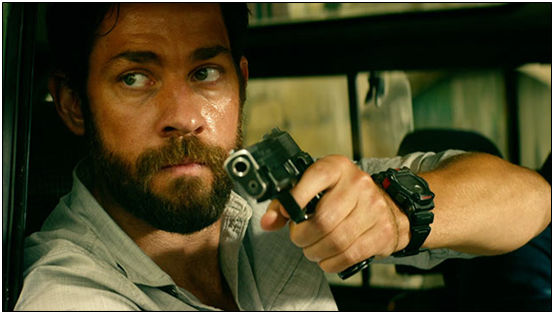By Dustin Howard
Spoiler alert: If you have not seen the movie, 13 Hours, and do not wish to have the movie spoiled, read no further.
I married a beautiful, non-political woman who watched 13 Hours: The Secret Soldiers of Benghazi with me last weekend. Upon leaving the theater, my wife was in tears. “Why didn’t they send help?” she asked. I had just told her why: These men had the misfortune of being attacked during an election.
The movie begins by stating “This is a true story” instead of hiding behind writers who augment details to entertain us. It leaves out any reference to Secretary of State Hillary Clinton, and barely mentions the President, all for the purpose of conveying a factual narrative without becoming a partisan attack.
Upon arriving in Libya, the camera tells a story that Libya is a failing state, with the bombed out wreckage of military hardware adorning even the runway of the airport. The main character, a government contractor providing security to a CIA outpost in Benghazi, Jack Silva, is being driven through the streets of the city by Tyrone Woods where they encounter a checkpoint manned by militia. In a moment of tension with heavy guns pointed in every direction, Woods bluffs his way out of the situation with a lie about the drone above. As they pull away, Silva asks Woods if it was true; Woods confirms it was a bluff, and tells Silva and the audience they are on their own, setting the tone for the entire movie.
After this, the build is slow. The CIA outpost in Benghazi was working to make sure the vanquished dictator Muammar Gadaffi’s weapons did not proliferate throughout the region and beyond. A character in the movie lamented it was like picking up “grains of sand in the desert”.
Fast forward to the attacks themselves, the viewer feels like they are running through the streets under-fire alongside the Americans. It sticks to the timeline, showing the time-lapse between the time when the initial attack occurred at the Ambassador’s house and the back and forth as the security team wants to rescue Ambassador Chris Stevens and his two guards, but was initially prevented by the CIA station chief, who himself was waiting for Washington to act. These scenes are where Michael Bay excels, and where the cinematography pulls the viewer in.
The movie climaxes when the security team returns with the Ambassador’s body, but scarcely have time to act before they themselves are attacked at the security outpost with small arms, rocket-propelled grenades and mortar fire. Throughout the hours-long combat sequences, the Americans are begging for outside help that so far as we know, didn’t arrive until it was much too late. There was no air-support or company of special forces to hold off the heavily armed militants.
The imagery and symbolism of militants firing at the American flag at the beginning of the attack, to another American flag floating in a puddle at the end of the film evokes the feelings of the Americans abandoned. At moments, the film shifts away to Washington, D.C. where officials discuss the crisis and the need to brief the President, who had the benefit of knowing about the situation in the afternoon in evening hours, as Washington, D.C. is 7 hours behind Libya.
Michael Bay’s 13 Hours brings home the anger and sadness of the 2012 Benghazi attack. In so doing, he staked his blockbuster making reputation on telling the truth, which is far less profitable than making up an alternative reality. A rarity in Hollywood, where truth and outrage are usually manufactured the way Detroit makes cars or Washington, D.C. bureaucrats make rules. Bay honors the memories of the fallen, instead of treating them like anonymous pawns in the chess game of foreign policy.
Note: The Center for Security Policy has prepared a detailed timeline of events leading up to and following the Benghazi attack, a must-read to answer the question why no help ever arrived.
Dustin Howard is a contributing editor at Americans for Limited Government.







